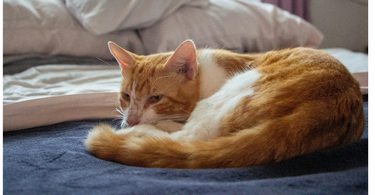It’s easy to assume your cat will be just fine while you’re away on holiday. After all, cats are famously independent creatures. But while they may not need daily walks or constant attention like dogs, they still rely on us for routine care, affection, and a stable environment. A sudden change or long periods of solitude can be stressful for them even more than we might expect.
Whether you’re heading off on a weekend city break or planning a long-awaited two week escape, it’s essential to prepare in advance and look after your cat's wellbeing. Leaving it until the last minute can leave both you and your cat anxious. So, what are your options and how do you decide what’s best for your pet?
Can You Leave a Cat Home Alone?
The short answer is yes, but not for long. Most healthy adult cats can safely be left alone for 24 to 48 hours as long as they have enough food, fresh water, a clean litter tray, and a safe environment. However, anything beyond that needs to be taken care of.
Here’s why: cats are creatures of habit. They thrive on familiarity and routine. While they may seem aloof at times, your daily presence provides them with a sense of security. If something unexpected happens while you’re gone like the water bowl tips over, the automatic feeder stops working or the litter box gets too dirty your cat could be stressed.
Prolonged periods of isolation can lead to boredom, destructive behaviour, or even depression, especially if they’re used to having you around every day.
Short holidays generally may be fine, any longer holiday should come with a solid care plan.
What Are Your Cat Care Options While You're Away?
The right option depends on your cat’s age, temperament, health, and level of socialisation. Some cats prefer their own space and get spooked by new environments, while others may thrive with lots of attention from new people.
Here are the most common and effective ways to ensure your cat is well looked after while you’re on holiday:
1. Ask a Friend or Neighbour for Help
Finding a pet sitter from a trusted friend, neighbour, or family member popping in once or twice a day is one of the easiest and most affordable solutions. It’s especially ideal if your cat already knows them they’ll feel safer and less anxious seeing a familiar face.
They can feed your cat, top up the water, scoop the litter box, and offer a bit of affection and playtime. Some may even be happy to spend an hour watching telly with your cat if they’re the cuddly type.
Tip: Always leave a written guide, including feeding routines, emergency contact details, your vet’s info, and where to find essentials like the litter, cat carrier, and treats.
Bonus: You might return the favour when your friend goes away, which makes it a great mutual arrangement.
2. Hire a Professional Pet Sitter
For longer holidays or if your cat has specific medical or emotional needs, a professional cat sitter can offer both convenience and peace of mind. You can hire them for daily visits or even full-time live-in care while you’re away.
The biggest benefit is your cat stays in their home environment meaning their routine, smells, and comfort zone remain intact. This can reduce the risk of stress-related issues like hiding, overgrooming, or appetite loss.
Many sitters also provide regular updates, photos, and reports so you can relax knowing all is well back home.
How to choose a pet sitter:
-
Look for sitters who are DBS checked, insured, and have good reviews or recommendations.
-
Ideally, choose someone with experience caring for cats, particularly if yours is a bit quirky or shy.
-
Arrange a meet-and-greet before you go. It gives your cat a chance to warm up and helps the sitter understand their routines and behaviours.
Pro Tip: Book early—especially around school holidays or festive periods, as experienced pet sitters can get fully booked months in advance.
3. Invite a House Sitter to Stay
If you want to keep everything as normal as possible for your cat, hiring or arranging for a house sitter can be a fantastic solution. A house sitter will live in your home, care for your cat as part of their daily routine, and ensure the house is looked after in your absence.
This is ideal for cats who are deeply attached to their environment or have set habits, like sleeping on a particular chair or sunbathing in a specific window.
Benefits include:
-
Your cat’s routine stays exactly the same.
-
Your home is occupied, which adds a layer of security.
-
You won’t come back to a cold, dusty, or stuffy house.
Tip: Arrange a video call or meeting before confirming, and discuss everything from your cat’s routines to house rules.
Preparing for Your Trip
Regardless of which care option you choose, preparation is key to ensuring your cat’s comfort and safety and properly cared for while you're away. A well prepped home and clear instructions can prevent stress for both your cat and their temporary carer.
Here’s a helpful pre holiday checklist:
-
Write detailed instructions for feeding times, food types, medications, and litter habits.
-
Highlight quirks such as favourite napping spots, hiding places, or how they react to visitors or loud noises.
-
Stock up on food, litter, medications, and any supplies needed for at least three extra days beyond your trip length.
-
Leave emergency contact details including your vet, a trusted friend, and your contact information.
-
Keep the environment familiar, don't rearrange furniture or deep clean their favourite spaces before you leave. Leave out their favourite blanket, toys, or scratch post.
-
Update your cat’s microchip information and ID tags if applicable.
Special Considerations for Kittens or Senior Cats
Young kittens and elderly cats often need more attention and care. Kittens may need multiple feedings a day, supervision, and socialisation, while senior cats might require medications, mobility assistance, or close observation for signs of illness.
In these cases, a professional sitter or a live-in house sitter is usually preferable to leaving them alone even for short periods. Boarding facilities with staff trained in senior cat care may also be a good option if live in care isn’t available.
Final Thoughts: Your Cat’s Holiday Matters Too
Going on holiday should be a relaxing experience. With a bit of thought and preparation, you can ensure your cat feels safe, content, and well cared for in your absence.
Whether it’s a trusted neighbour, a professional sitter or a live-in house guest, the right solution will depend on your cat’s unique personality and needs. And when you return, you’ll be welcomed back by a happy, healthy cat who has been well looked after.


Helpful article, thank you!
It’s interesting that you only mention boarding catteries for kittens or senior cats. I have always felt that my cat would be more stressed being at home, without my routines, with strangers, either popping in or staying – and have always taken my cats to recommended catteries when I have been away from home. They are safe, they have routine, and I believe they are well looked after – I have never had reason to believe that they are stressed – I don’t get the cold shoulder when they come home. I wonder why you don’t consider it an option for cats other than kittens or older cats?